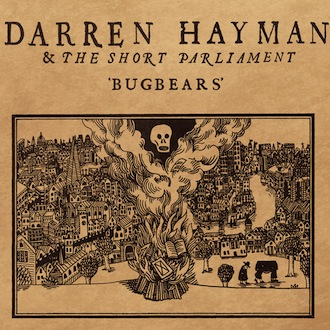Darren Hayman concluded his ‘Essex trilogy’ of albums with last autumn’s The Violence, a long-planned study of the 17th century Essex Witch Trials. Bugbears is its companion piece, an album born from the same bout of research but concentrating on folk songs of the period, particularly those associated with the English Civil War.
Compared to its sibling, Bugbears is the lesser work, recorded by a shortened and reshuffled line-up of Hayman’s Long Parliament band. However, as Duncan Barrett’s fine cover illustration of book-burning beneath The Shard suggests, it shares with The Violence an intention to reflect the 21st century as much as the 17th.
Like Ben Wheatley’s recent Civil War film A Field In England, whose folk-singing simpleton ‘Friend’ (Richard Glover) was also an Essex man, Hayman recognises the birth of modernity in the social upheaval of that era. Many of the songs presented here survive because of the boom in printing, a cultural shift that not only spread political arguments in the form of pamphlets and brought us our earliest weekly newspapers, but also produced the broadside ballad, single-sided popular songsheets that are a precursor to today’s unit-focussed music industry. Although the charts were centuries away, the masses could now purchase songs cheaply.
Parts of Bugbears chew over the fate of the common citizen in "the world turned upside down", in what power may reside in our hands when our old leaders are deposed. Tempting as it is to ponder revolution in the face of our atrocious, mandate-less government, Hayman’s selections (‘Impossibilities’, ‘Old England Grown New’) follow the fatalist view that nothing truly changes. One master replaces another, the workers remain under the boot.
Sex and drinking recur here, themes that run through English folk as thickly as in Hayman’s own catalogue. As his sleevenotes admit, he’s edited and rewritten lines freely, with adapted and original arrangements to suit the Short Parliament musicians (The Wave Pictures’ David Tattersall and Allo Darlin’s Bill Botting among them). ‘Hey Then Up We Go’ has a lilting electric guitar solo, ‘The Contented’ a light, blues twang. It all serves to strengthen the parallels between then and now.
Beyond Bugbears‘ supplementary nature, it’s a coherent collection of songs, a window to a period closer in time and temperament to our own than we imagine. By happy accident it also offers respite from folk’s Cameron-endorsed sons and daughters of the manor, wrestling the people’s music out of their grasp and planting its roots firmly in the muddy fields of Essex.


